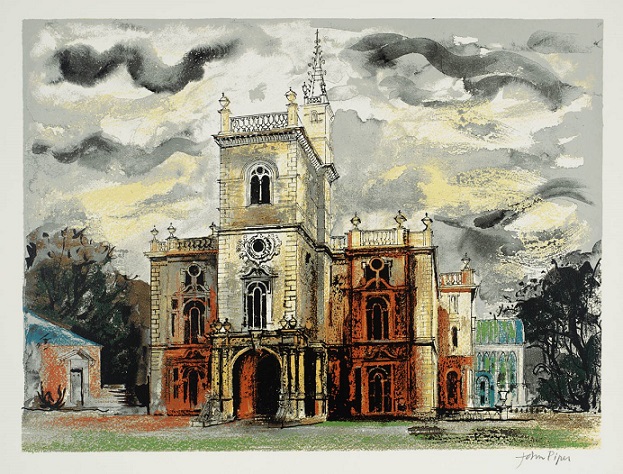
Flintham by John Piper, 1977. (c) The Piper Estate. Image used courtesy of Tate
Praise We Great Men, for soprano, mezzo-soprano, tenor, bass, chorus (SATB) and orchestra (July-October 1976, orchestrated by Colin Matthews. Britten aged 62)
Dedication Written for Mstislav Rostropovich to perform in Washington, July 1977
Text Edith Sitwell
Duration 7’30”
Background and Critical Reception
And so we reach the last work in the Britten Thematic Catalogue – BTC no. 1184, to be exact – which, from a man who only allocated 95 opus numbers, is a staggering statistic. Yet this final piece, a short cantata where Britten returned to the poetry of Edith Sitwell for the first time since the Third Canticle, remained unfinished, given a helping hand to its halfway point by Britten’s assistant Colin Matthews, who also orchestrated the piece.
The final volume of Letters From A Life, the exhaustive reproduction and contextualisation of Britten’s letters by Philip Reed, Donald Mitchell and Mervyn Cooke, reveals that ‘during the 1960s, Britten copied out the poem into the red exercise book he regularly used for his composition projects. The work was abandoned at that time and not revived until 1976, when Britten added his musical annotations’.
In an interview for this site, Matthews talked about the piece in detail. ‘I didn’t ‘complete’ it, as there was nearly half still to be written when Britten died, and I felt it should stop exactly where he had left it. (Except that, after an empty bar, I added an instrumental coda, based on the penultimate section.) We’d already agreed that I would orchestrate it, which would have been a more elaborate process than the Welcome Ode, and I completed the score a month or two after Britten’s death. It was nearly another ten years before Rostropovich (for whom it was being written) gave the first performance.’
Thoughts
This first performance was not in Washington, where Rostropovich was to conduct it as part of his first season with the National Symphony Orchestra, but – rather appropriately – in the Snape Maltings, where Rostropovich conducted the Philharmonia Chorus and Orchestra. The vocal soloists were Marie McLaughlin, Heather Harper, Philip Langridge and Richard Jackson.
Britten’s final utterance gets off to a rousing start, the open fifths of the chorus declamation like a great gust of air that passes through from the top of the texture to the bottom. The orchestra are very much secondary to this, but shrill piccolo interjections start to break up the choral text before a tenor solo, ‘Praise we the just’. This would undoubtedly have been for Pears, and is all the more moving when sensing that. More soloists join the crowd, and the orchestra becomes more soloistic, before a ‘Coda’, in serene C major, brings the music to a standstill, effectively stopping in mid flow.
At this point it is literally as if Britten has stopped writing, closed his book, laid down his pen and gone to sleep. As the last line of Sitwell’s poem states, ‘on wings of music let us rise’.
Recordings used
Robert Tear (tenor), Alison Hargan (soprano), Mary King (mezzo-soprano), Sir Willard White (bass), CBSO Chorus, City of Birmingham Symphony Orchestra / Sir Simon Rattle (EMI)
The only recording of Praise We Great Men is part of Sir Simon Rattle’s valuable Britten anthology released with the City of Birmingham Symphony Orchestra back in 1991. The chorus sing with gusto and the orchestra are ideally balanced – both in performance and by the engineers. The soloists are good but Robert Tear is exceptional in his first solo.
Spotify
Rattle conducts Britten can be found on Spotify here, with Praise We Great Men appearing towards the end of the first disc, starting at track 18.
Also written in 1976: Górecki – Symphony no.3, Op.36,’Symphony of Sorrowful Songs’
